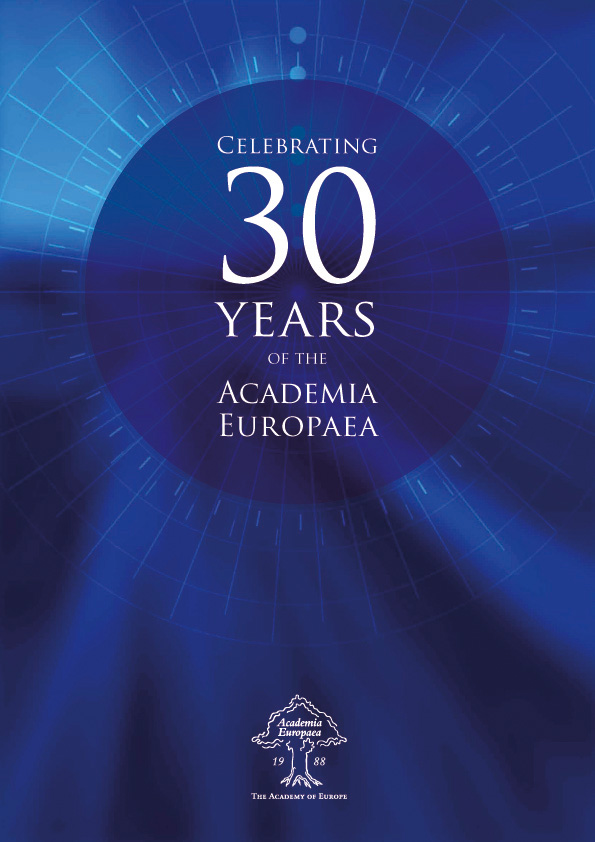30 years Academia Europaea#
In celebration of its 30th anniversary year Academia Europaea published an anniversary brochure and a time line
and a time line of the history of Academia Europaea (low resolution).
of the history of Academia Europaea (low resolution).
Read also the article "Academia Europaea: Origin and Early Days ", by the founder and first president of Academia Europaea, Sir Arnold Burgen, published in the European Review, Vol. 17, Nos.3&4, 469-475.
", by the founder and first president of Academia Europaea, Sir Arnold Burgen, published in the European Review, Vol. 17, Nos.3&4, 469-475.
The Academy of Europe - Academia Europaea#
We are a European, non-governmental association acting as an Academy. Our members are scientists and scholars who collectively aim to promote learning, education and research. Founded in 1988, with over 4500 members which includes leading experts from the physical sciences and technology, biological sciences and medicine, mathematics, the letters and humanities, social and cognitive sciences, economics and the law.
History of the Academia Europaea#
The concept of a 'European Academy of Sciences' was raised at a meeting in Paris of the European Ministers of Science in 1985. The initiative was taken by the Royal Society (UK) which resulted in a meeting in London in June 1986 of Arnold Burgen (UK), Hubert Curien (F), Umberto Columbo (ITA), David Magnusson (S), Eugen Seibold (Germany) and Ruud van Lieshout (NL) – who agreed to the need for a new body that could express the ideas and opinions of individual scientists from across Europe.
This body was seen to be a complement to the European Science Foundation in its role as a co-ordinator of the European interests of national research funding agencies and organisations. The objectives were kept deliberately broad covering the humanities, social and natural sciences, so as to ensure interdisciplinary discourse and activities. Initial modalities were to include annual meetings of members, multidisciplinary meetings, an interdisciplinary journal, a newsletter, providing independent advice, improving mobility of scholars within Europe and improving public understanding of science.
The new body was named the Academia Europaea and its Foundation Meeting was held in Cambridge in September 1988 under the first President, Arnold Burgen. Hubert Curien, who was at that time the French Minister of Science (and later became the second President of the Academia) arrived by helicopter and gave the inaugural address and provided the active support of the French government. The first Plenary Meeting was held in London in June 1989, by which time there were 627 members.
Since 1989, there has been a period of remarkable changes to the scientific, political and economic landscape of the continent of Europe. The Academia Europaea has evolved within this environment, from its origins as an organisation of predominantly "western European" scholars, into a uniquely independent body - a truly pan-European Academy of Sciences, Humanities and Letters.
The funding of the Academy is based on an original endowment, contributions from some of the member countries, special projects (such as the Riksbanken project) and by other organisations like the Academie Leopoldina who is also supporting the Academia Europaea financially. See also under Patrons.
project) and by other organisations like the Academie Leopoldina who is also supporting the Academia Europaea financially. See also under Patrons.
Founding Visions of the Academia Europaea#
in 2014, Professor Anne Buttimer (University College Dublin) conducted a series of video-recorded interviews with members of Academia Europaea's founding generation, inviting each one to express the ideas and motivations which inspired the venture.
View the interviews with founding members.
Past presidents of Academia Europaea#
Sir Arnold Burgen (1988 - 1994)
Hubert Curien (1994 - 1997)
Stig Strömholm (1997 - 2003)
Jürgen Mittelstrass (2003 - 2009)
Lars Walløe (2009 - 2014)
Sierd Cloetingh (2014 - 2020)
Marja Makarow (2020 - 2024)




